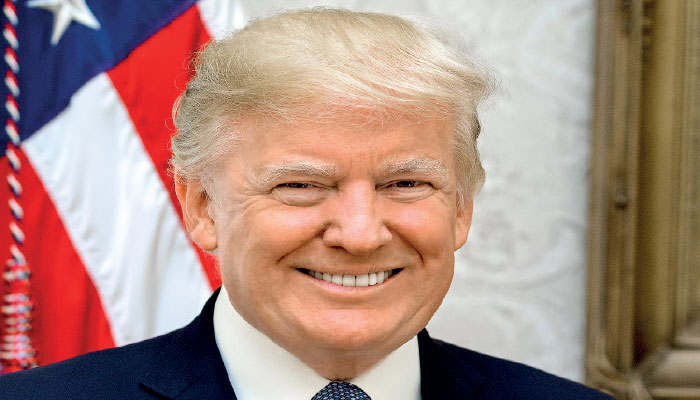Friday Feb 20, 2026
Friday Feb 20, 2026
Thursday, 30 October 2025 00:26 - - {{hitsCtrl.values.hits}}

Donald Trump’s policies offer a pragmatic reset that challenges the status quo, discourages aggression, and prompts nations to rethink their priorities
 The post-war international order was built on ideals, yet the world remains far from ideal. Inequalities persist, conflicts continue, and institutions often lack teeth. In such a context, strong leadership that combines assertiveness, accountability, and pragmatic negotiation is essential. Trump’s tenure represents, for many, a reset of the global system. Through tariffs, bilateral negotiations, and a firm stance on reciprocity, he has challenged nations to rethink strategies, discouraged unilateral aggression, and promoted enforceable standards of fairness. His recent mediation in the Cambodia-Thailand accord underscores his capacity to stop fighting and bring peace while recalling nations to rethink their priorities
The post-war international order was built on ideals, yet the world remains far from ideal. Inequalities persist, conflicts continue, and institutions often lack teeth. In such a context, strong leadership that combines assertiveness, accountability, and pragmatic negotiation is essential. Trump’s tenure represents, for many, a reset of the global system. Through tariffs, bilateral negotiations, and a firm stance on reciprocity, he has challenged nations to rethink strategies, discouraged unilateral aggression, and promoted enforceable standards of fairness. His recent mediation in the Cambodia-Thailand accord underscores his capacity to stop fighting and bring peace while recalling nations to rethink their priorities
 The post-war promise and the present reality
The post-war promise and the present reality
For decades, the world has promised peace, prosperity, and fairness through international institutions, free trade, and development aid. Yet inequality persists, conflicts continue, and smaller nations remain vulnerable. In this fractured global landscape, strong, decisive leadership that enforces accountability is not only desirable but necessary. Donald Trump’s policies offer a pragmatic reset that challenges the status quo, discourages aggression, and prompts nations to rethink their priorities.
Since 1945, the world has built an intricate system aimed at peace, prosperity, and equality. The United Nations was established to prevent war, the World Trade Organization to regulate commerce, free trade agreements to spur economic growth, and countless initiatives sought to lift developing nations out of poverty. Climate agreements, anti-terrorism measures, and human rights frameworks promised a fairer, more inclusive global order.
Yet decades later, the ideal remains largely unfulfilled. Globalisation widened economic gaps, and powerful nations often act in self-interest, leaving poorer countries and vulnerable populations exposed. UN resolutions and trade agreements, while symbolically important, have often lacked enforceability. Climate promises have frequently been symbolic rather than binding, and international institutions have struggled to prevent conflicts or hold major powers accountable.
Even foreign direct investment in countries like Sri Lanka and Bangladesh is often mismanaged or misaligned with long-term development goals. While such investments can create temporary employment and improve infrastructure, the outcomes frequently remain just sufficient for survival, not for sustainable growth or true prosperity. The economic benefits often resemble a cycle of buying and selling small-scale vendors rather than addressing systemic problems. Decades of investment and development aid have not enabled these countries to overcome structural challenges such as inequality, weak institutions, and dependence on external powers, leaving the core issues largely unresolved.
In this context, US President Donald Trump’s leadership offers an unconventional but pragmatic reset, one that challenges the status quo, enforces accountability, and encourages nations to rethink their policies.
A realist approach to global governance
Trump’s administration frequently clashed with conventional norms, but his policies were rooted in strategic realism. Tariffs, trade renegotiations, and direct diplomacy reflected a focus on results over rhetoric.
By prioritising enforceable outcomes rather than symbolic adherence, Trump pressured the world to align practice with promise, a principle the post-war system often failed to uphold.
Stopping conflicts and recalling nations to rethink
One of the most notable aspects of Trump’s foreign policy was his willingness to directly intervene in long-standing conflicts. While critics argue about style, the results are factual:
Such interventions reflect a leadership style that forces nations to rethink policies, reconsider aggressive strategies, and evaluate the consequences of their actions. By applying pressure, Trump’s approach often creates incentives for negotiation and de-escalation where inertia might otherwise prevail.
Addressing global inequalities
Beyond conflict, Trump’s policies also resonate with broader structural concerns:
In effect, Trump’s policies serve as a wake-up call. Fairness requires enforcement, accountability cannot be symbolic, and agreements must have real consequences for all parties.
A new global order with strong leadership
The modern world is multipolar. China, India, Russia, and the United States wield disproportionate influence over economic, security, and environmental outcomes. Climate change, terrorism, cyber threats, and economic inequality demand coordination, but coordination alone is insufficient. Without enforcement, rules are ignored, agreements broken, and the weakest bear the cost.
Trump’s approach, assertive, results-oriented, and unapologetically strategic, offers a model for a world where strong leadership enforces accountability and prevents exploitation. It demonstrates that decisive action can:
While debate over methods is natural, the principle is clear: the world sometimes needs leaders capable of taking decisive action, not just issuing statements or promises.
A leadership the world deserves
The post-war international order was built on ideals, yet the world remains far from ideal. Inequalities persist, conflicts continue, and institutions often lack teeth. In such a context, strong leadership that combines assertiveness, accountability, and pragmatic negotiation is essential.
Trump’s tenure represents, for many, a reset of the global system. Through tariffs, bilateral negotiations, and a firm stance on reciprocity, he has challenged nations to rethink strategies, discouraged unilateral aggression, and promoted enforceable standards of fairness. His recent mediation in the Cambodia-Thailand accord underscores his capacity to stop fighting and bring peace while recalling nations to rethink their priorities.
In a world struggling with polarisation, climate crises, and uneven development, it is not unreasonable to argue that the global community deserves leaders who can stop fighting, enforce rules, and prompt nations to reconsider their priorities. Trump’s approach, controversial though it may be, underscores a fundamental truth: idealism alone cannot preserve order, the world needs action, accountability, and decisive leadership.